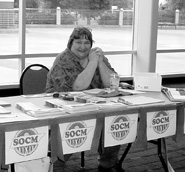Voices from the Field:
Citizen Activist Cathie Bird is Building Bridges
By Julie Johnson

Community and Environmental Advocate Cathie Bird works for Statewide Organizing for Community Empowerment (SOCM), a group dedicated to solving social and environmental issues in Tennessee. Bird is the chair of the Strip Mine Issues Committee and a member of SOCM’s Anti-racism Transformation Team.
Q: What are your first memories of environmental consciousness?
Cathie: I was raised on a Kansas farm and I look back on that as a foundation of being in touch with the earth and its processes, although I didn’t understand a lot of them.
As I got older, I spent a lot of time with family in Colorado and really got into hiking and just loving to be out in nature. I majored in Conservation at Ohio State, and went from there to Michigan State’s College of Agriculture and majored in Parks and Recreation Administration with a focus in Environmental Interpretation.
Q: How did you begin working in conservation?
Cathie: I worked at Wind Cave National Park in South Dakota. I was a ranger-naturalist and got involved in cave exploring and all kinds of cool stuff. That prairie environment was familiar from my Kansas farm childhood. They had a huge buffalo herd. I worked with Youth Conservation Corps one summer as an environmental education specialist. Then there was this huge forest fire in Colorado and that summer I worked on a resources crew, repairing trail damaged caused by the fire.
I kept writing, kept studying, and then came to a spiritual awakening. I started putting together a deeper connection with the earth and how people relate to it and kind of where things went wrong with our relationship to the planet and where we could be going if we just figured things out.
Q: How did you begin working with SOCM?
Cathie: I moved here to Tennessee in 2000, to a home just southeast from Huntsville, near Big South Fork. My neighbor is Royal Blue Wilderness Area, owned by the state of Tennessee. There had been mining here before and there was potential for it to be mined again. So I got here, and it was not too long after that the Zeb Mountain issue popped up. I went to a SOCM meeting about it, and have been working with them ever since.
Q: Tell us a little more about your experience organizing against mountaintop removal at Zeb Mountain.
Cathie: Well, Zeb Mountain is about six miles north of my home, so it’s not a direct impact, but I knew that there was also a permit that was going to happen just a half mile from me. Nothing was happening, so I thought, well if I help them now maybe I can stop it.
Zeb Mountain had been mined a long time ago and the company that applied to open a new 2,100 acre mine said their project would improve land and waterways damaged in the old days. We got a fish biologist from University of Tennessee to go in and do an assessment of Dan Branch. He found that the stream was really in pretty good shape.
The larger creek it emptied into even had Blackside Dace, a federally listed fish.So then we said, “Why are you writing your permits on the basis that this stream is non-supporting?” Not long after the permit was granted, they got a temporary shutdown order because a huge section of haul road gave way and trashed that same stream.
There was all this legal back and forth happening. It has been a big mess and Tennessee Sierra, SOCM and Tennessee Clean Water Network are suing National Coal over the selenium pollution they caused in a another Zeb watershed.
Q: How did you get involved with SOCM’s anti-racism campaign?
Cathie: Well, I had focused on fighting mining, but SOCM is really about empowering all people in Tennessee to improve life in their communities. SOCM decided to take a hard look at itself as an organization and ask if it was structured in a way that keeps people of color out of our community empowerment process.
I’ve been reading a lot of Van Jones’ writing and studying how he merges the best of what the environmental movement has accomplished and what we need to do to address today’s challenges for jobs, poverty and our environment that affect everyone. One of SOCM’s newer projects is trying to figure out how to make a green collar economy work in Tennessee.
I still feel a split between people that are involved in environmental issues and those involved in social issues. I would like to help bridge the gap. Social and environmental issues have a common root in exploitation and oppression of people and nature.
Related Articles
Latest News

Leave a comment
Your email address will not be published. Required fields are marked *





Leave a Comment